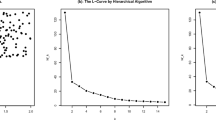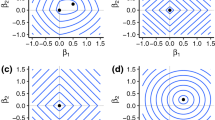Abstract
This paper presents a novel independent component analysis algorithm that separates mixtures using serially updating geodesic method. The geodesic method is derived from the Stiefel manifold, and an on-line version of this method that can directly treat with the unwhitened observations is obtained. Simulation of artificial data as well as real biological data reveals that our proposed method has fast convergence.
Preview
Unable to display preview. Download preview PDF.
Similar content being viewed by others
References
Jutten, C., Herault, J.: Blind Separation of Sources: An Adaptive Algorithm Based on Neuromimetic Architecture. Signal Processing 24, 1–10 (1991)
Hyvarinen, A., Karhunen, J., Oja, E.: Independent Component Analysis. Wiley, New York (2001)
Douglas, C.: Self-stabilized Gradient Algorithms for Blind Source Separation with Orthogonality Constrains. IEEE Transactions on Signal Processing 11, 1490–1497 (2000)
Manton, H.: Optimization Algorithms Exploiting Unitary Constrains. IEEE Tran. on Signal Processing 50, 635–650 (2002)
Edelman, A., Arias, T., Smith, S.T.: The Geometry of Algorithms with Orthogonality Constraints. J. Matrix Anal. Appl. 20, 783–787 (1998)
Douglas, C., Amari, S.: Natural Gradient Adaptation in Unsupervised Adaptive Filtering. In: Haykin, S. (ed.) Blind Source Separation, pp. 13–61. Wiley, New York (2000)
Fiori, S.: Qusi-geodesic Neural Learning Algorithms Over the Orthogonal Group: A Tutorial. Journal of Machine Learning Research 1, 1–42 (2005)
Edelman, A., Arias, T.A., Smith, S.T.: The Geometry of Algorithms with Orthogonality Constraints. Matrix Anal. Applicant. 20, 303–353 (1998)
Plumbley, D.: Algorithms for Nonnegative Independent Component Analysis. IEEE Transactions on Neural Networks 14, 534–543 (2003)
Nishimori, Y.: Learning Algorithm for ICA by Geodesic Flows on Orthogonal Group. In: PIJC Neural Networks, Washington, DC, vol. 2, pp. 933–988 (1999)
Nishimori, Y., Akaho, S.: Learning Algorithms Utilizing Quasi-geodesic Flows on the Stiefel Manifold. Neurocomputing 67, 106–135 (2005)
Cardoso, L.: Equivariant Aadaptive Source Separation. IEEE Trans. on Signal Processing 44, 3017–3030 (1996)
Choi, S., Cichocki, A., Amari, S.: Flexible Independent Component Analysis. Neural Networks for Signal Processing VIII, 83–92 (1998)
Girolami, M.: Self-Organising Neural Networks. Independent Component Analysis and Blind Source Separation. Springer, London (1999)
Author information
Authors and Affiliations
Editor information
Editors and Affiliations
Rights and permissions
Copyright information
© 2006 Springer-Verlag Berlin Heidelberg
About this paper
Cite this paper
Yu, T., Shao, HZ., Peng, QC. (2006). An ICA Learning Algorithm Utilizing Geodesic Approach. In: Wang, J., Yi, Z., Zurada, J.M., Lu, BL., Yin, H. (eds) Advances in Neural Networks - ISNN 2006. ISNN 2006. Lecture Notes in Computer Science, vol 3971. Springer, Berlin, Heidelberg. https://doi.org/10.1007/11759966_162
Download citation
DOI: https://doi.org/10.1007/11759966_162
Publisher Name: Springer, Berlin, Heidelberg
Print ISBN: 978-3-540-34439-1
Online ISBN: 978-3-540-34440-7
eBook Packages: Computer ScienceComputer Science (R0)




